Are you curious about destinations where adult entertainment is legal and regulated? If so, understanding the landscape of sex tourism is essential. SIXT.VN offers travel guidance and services that respect your choices while ensuring safety and discretion during your international travels. Discover legal frameworks and cultural nuances.
1. Understanding Sex Tourism and Legality
Sex tourism involves traveling to a specific location with the primary intention of engaging in sexual activities. The legality of prostitution and related activities varies considerably worldwide. Laws range from complete legalization to strict prohibition, each country having its own approach shaped by cultural, moral, and social factors.
1.1 Global Overview of Prostitution Laws
Currently, approximately 51% of the world’s population lives in countries where prostitution is legal, while 37% live in countries where it is illegal, highlighting the diversity of global attitudes toward the sex industry. According to research from the World Population Review, various countries have legalized prostitution to regulate it, protect sex workers, and generate tax revenue. The varied legal statuses around the globe demonstrate the complexity of this issue.
1.2 Key Legal Frameworks
Understanding the different types of legal frameworks is critical for any traveler. There are three primary models:
- Legalization: Prostitution is fully legal and regulated, with sex workers often required to register and undergo health checks.
- Decriminalization: The act of prostitution is legal, but related activities such as brothel ownership or pimping may be illegal.
- Prohibition: All aspects of prostitution are illegal, including buying and selling sexual services.
2. Top Countries Where Prostitution is Legal
Several countries have legalized or decriminalized prostitution to varying degrees. Here’s a closer look at some of the most notable destinations:
2.1 Europe
2.1.1 Germany
Legal prostitution in Hamburg, Germany
Germany legalized prostitution in 2002. It aims to provide sex workers with social security and health benefits. According to the Federal Statistics Agency, the number of registered sex workers in Germany was 28,280 at the end of 2022, a rise of 19.1% compared with the year before. The legal age for sex work is 18.
2.1.2 Netherlands
The infamous Red Light District in Amsterdam, Netherlands.
The Netherlands decriminalized and regulated prostitution in 2000. The most famous area is Amsterdam’s Red Light District. A report indicates approximately 25,000 prostitutes work in the Netherlands, with around 1,000 working daily in Amsterdam’s Red Light District alone. The legal age for engaging in sex work is 21.
2.1.3 Austria
Prostitution in Vienna, Austria, is legal.
Austria decriminalized prostitution in 1975. Sex workers are required to register, undergo health examinations, and pay taxes. According to Statista, there were around 5,279 registered prostitutes in Austria in 2022.
2.1.4 Switzerland
 Legal Prostitution in Switzerland
Legal Prostitution in Switzerland
Prostitution has been decriminalized and regulated in Switzerland for several decades. Both selling and buying sex are legal activities for consenting adults. UNAIDS estimates there to be 20,000 prostitutes in the country.
2.1.5 Greece
Legal Prostitution in Greece.
Prostitution was decriminalized in Greece in 2016. Sex workers must register and undergo frequent health checkups. It is estimated that fewer than 1,000 women are legally employed as prostitutes, and approximately 20,000 women are engaged in illegal prostitution.
2.1.6 Luxembourg
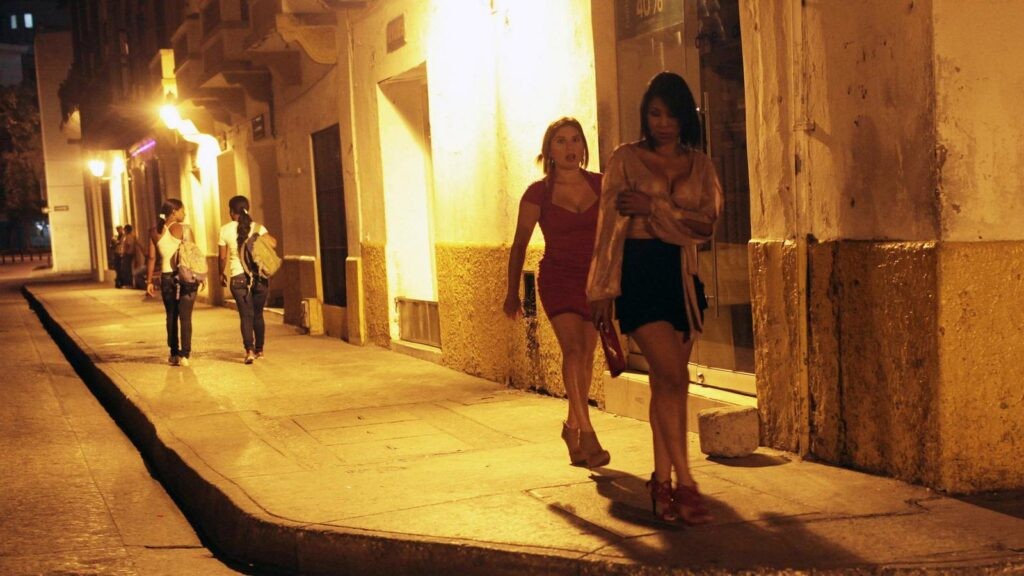 Prostitutes in Luxembourg
Prostitutes in Luxembourg
Luxembourg decriminalized prostitution and implemented a regulatory framework. Both selling and buying sex are legal activities for consenting adults. There are estimated to be 300 prostitutes in Luxembourg, most of whom are immigrants.
2.1.7 Spain
 Prostitution in Spain
Prostitution in Spain
Spain decriminalized prostitution in 1995. Medicos del Mundo estimates there are some 350,000 women in prostitution in Spain, and 80% percent of them are foreigners without legal papers.
2.2 The Americas
2.2.1 Mexico
 Prostitution in Mexico
Prostitution in Mexico
Mexico City decriminalized sex work in 2010. UNAIDS estimated the number of prostitutes in the country at 236,930 in 2016.
2.2.2 Colombia
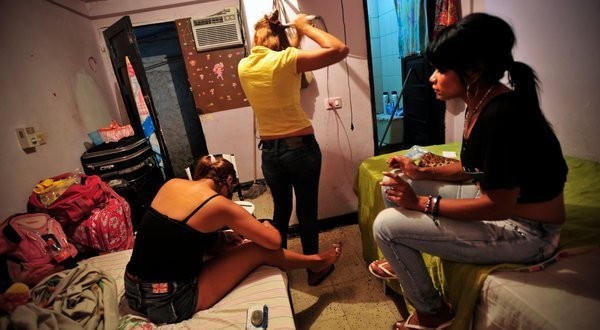 Prostitution in Colombia
Prostitution in Colombia
It is legal to work in the sex industry in Colombia, though pimping isn’t. UNAIDS estimates there to be 7,218 prostitutes in the country.
2.2.3 Ecuador
Ecuador decriminalized adult consensual sex work in 2011.
Ecuador decriminalized adult consensual sex work in 2011. UNAIDS estimates there to be 35,000 prostitutes in the country.
2.2.4 Venezuela
 Prostitution in Venezuela
Prostitution in Venezuela
Prostitution is legal in Venezuela, and there are regulations in place to govern the sex industry. A study of 212 sex workers conducted in 2003 found that 91% of workers were Venezuelan.
2.2.5 Bolivia
 Prostitution in Bolivia
Prostitution in Bolivia
Bolivia has taken steps to decriminalize and regulate prostitution. In 2016, UNAIDS estimated there were 30,523 prostitutes in Bolivia.
2.2.6 Peru
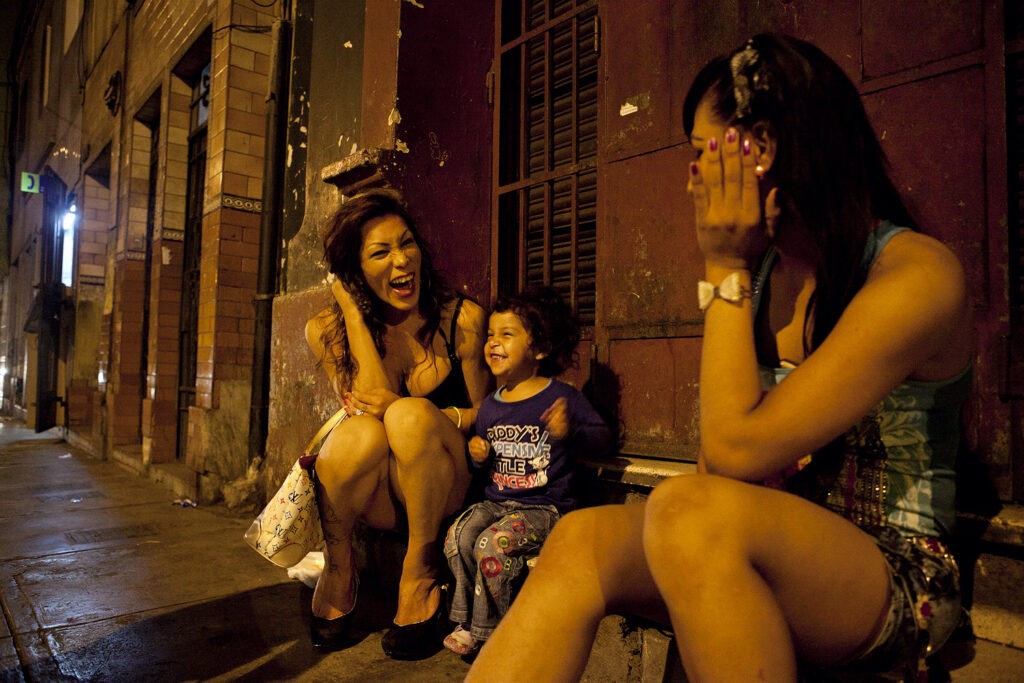 Prostitution in Peru
Prostitution in Peru
Peru has decriminalized adult consensual sex work. UNAIDS estimates there to be 67,000 prostitutes in the country.
2.2.7 Panama
 Prostitution in Panama
Prostitution in Panama
Prostitution is legal in Panama, and there are regulations in place to govern the sex industry. There were 2,650 sex workers registered with the government in 2008.
2.2.8 Uruguay
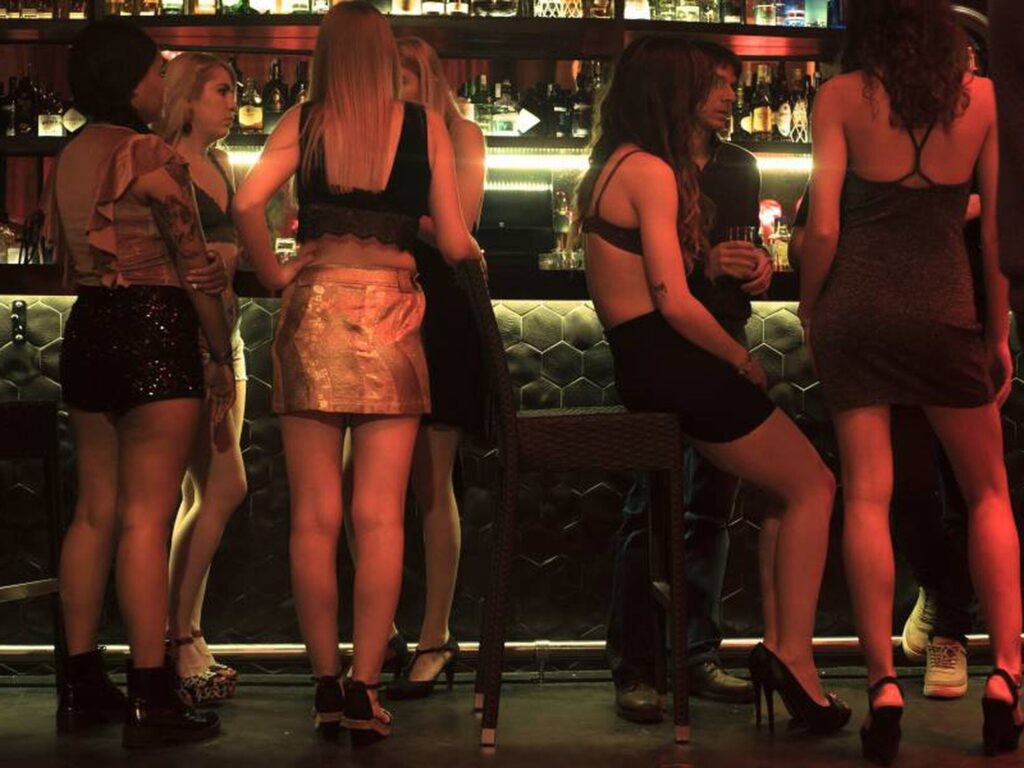 Prostitution in Uruguay
Prostitution in Uruguay
Uruguay has legalized and regulated prostitution. UNAIDS estimates there are 8,195 prostitutes in Uruguay.
2.2.9 Mozambique
 Prostitution in Mozambique
Prostitution in Mozambique
It is legal and widely accepted in Mozambique. UNAIDS estimates there to be 13,554 prostitutes in the country.
2.2.10 United States
 Prostitution in the United States
Prostitution in the United States
Prostitution laws in the United States have historically been diverse in various regions. Nevada is an exception, where certain counties allow regulated and legal prostitution in licensed brothels, subject to specific regulations. A 2012 report by Fondation Scelles indicated that there were an estimated 1 million prostitutes in the U.S.
2.3 Asia
2.3.1 India
 Prostitution in India
Prostitution in India
Prostitution is legal in India, but soliciting and public prostitution are illegal. UNAIDS estimates there were 657,829 prostitutes in the country as of 2016.
2.3.2 Bangladesh
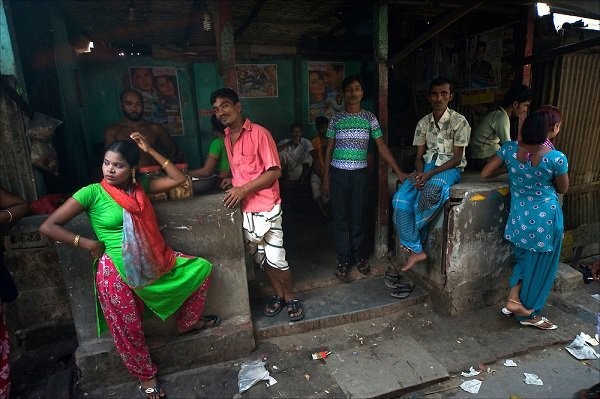 Prostitution in Bangladesh
Prostitution in Bangladesh
Male prostitution is illegal, but everything else is legal. There are 20 brothel villages in the country. The largest is Daulatdia, which has about 1,300 sex workers.
2.3.3 Lebanon
 Prostitution in Lebanon
Prostitution in Lebanon
Lebanon does not have clear-cut laws specifically addressing prostitution. In 2016, UNAIDS estimated there were 30,523 prostitutes in Bolivia.
2.3.4 Indonesia
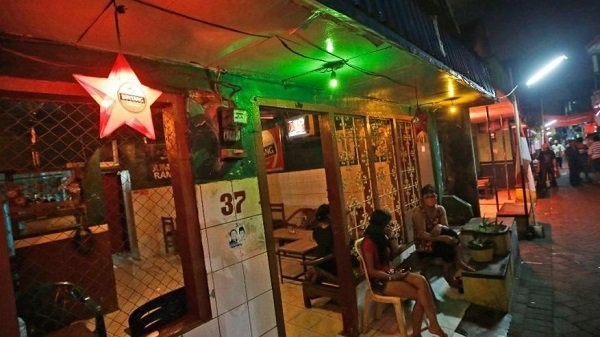 Prostitution in Indonesia
Prostitution in Indonesia
Prostitution itself is not even present in their law in any clear form, it’s plain to say that the sex trade is legal. It is estimated that 40,000 to 70,000 Indonesian children engage in prostitution within the country.
2.4 Oceania
2.4.1 Australia
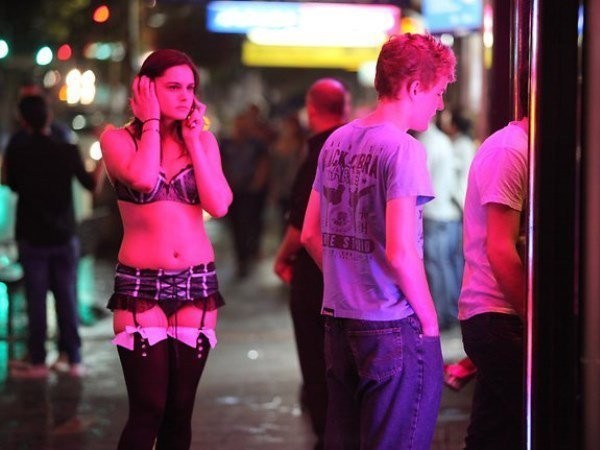 Prostitution in Australia
Prostitution in Australia
The legal status of prostitution in Australia differs from state to state. It is decriminalized in some areas and illegal in other parts. The market size of the Brothel Keeping and Sex Worker Services industry increased 19.5% in 2023.
2.4.2 New Zealand
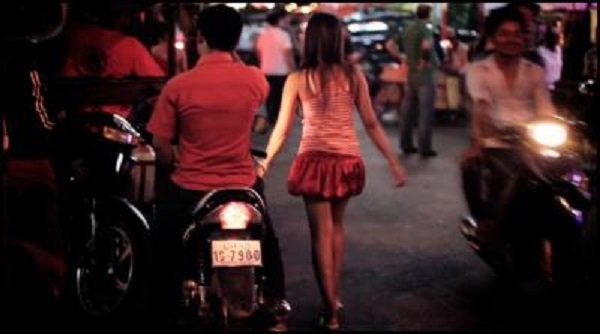 Prostitution in New Zealand
Prostitution in New Zealand
New Zealand is one of those countries where prostitution is legalized since 2003. The NZPC (New Zealand Prostitutes Collective) estimates there are around 8,000 sex workers in New Zealand at any one time.
2.5 Africa
2.5.1 Sierra Leone
 Prostitution in Sierra Leone
Prostitution in Sierra Leone
Prostitution is legal and commonplace, and 3rd party involvement is prohibited by the Sexual Offences Act 2012. UNAIDS estimates there are 240,000 prostitutes in the country.
3. Factors to Consider When Choosing a Destination
When considering a destination for sex tourism, several factors beyond legality should be taken into account to ensure a safe and respectful experience:
3.1 Safety and Health
Prioritize destinations with strong health regulations and access to healthcare for sex workers. Countries with legalized and regulated prostitution often have mandatory health checks and standards. According to the World Health Organization, regular health screenings are crucial to prevent the spread of sexually transmitted infections.
3.2 Ethical Considerations
Avoid destinations where sex trafficking and exploitation are prevalent. Support countries that prioritize the rights and safety of sex workers. The United Nations Office on Drugs and Crime (UNODC) reports that human trafficking is a significant concern in many countries where prostitution is legal.
3.3 Cultural Norms and Respect
Be aware of and respect local customs and laws. Conduct yourself in a manner that does not exploit or demean individuals. A study by the World Tourism Organization emphasizes the importance of responsible tourism that respects local cultures and traditions.
4. Countries Where Prostitution is Illegal
Many countries around the world still consider prostitution illegal. It’s essential to be aware of these laws to avoid legal issues when traveling.
4.1 Notable Countries with Illegal Prostitution
- China: Prostitution is illegal, with frequent legal exceptions.
- Russia: Punishment for engagement is a fine.
- Philippines: Prostitution is illegal but tolerated.
- Vietnam: Prostitution is considered a serious crime.
4.2 Penalties and Enforcement
The penalties for engaging in prostitution in these countries can range from fines to imprisonment. Enforcement varies widely, with some countries turning a blind eye and others actively prosecuting offenders.
5. What are the 5 most important things to consider before going on a sex trip?
Before embarking on a trip that involves sex tourism, consider these five crucial aspects to ensure a responsible and safe experience.
5.1. Research Local Laws and Regulations Thoroughly
Understanding the legal status of prostitution is essential. The legal frameworks vary significantly by country, ranging from full legalization to strict prohibition. Knowing the local laws helps you avoid legal troubles and ensures you are acting within the boundaries of the local jurisdiction.
5.2 Assess Health and Safety Measures
Prioritize destinations with robust health regulations and safety measures for sex workers. Legalized and regulated prostitution often includes mandatory health checks and standards. Ensure access to reliable healthcare services and be vigilant about your health and safety.
5.3 Consider Ethical Implications
Avoid destinations where sex trafficking and exploitation are prevalent. Support countries that prioritize the rights and safety of sex workers. Research the local environment to ensure that your actions do not contribute to exploitation or harm.
5.4 Respect Local Culture and Customs
Be aware of and respect local customs and cultural norms. Act responsibly and avoid behaviors that exploit or demean individuals. Respectful interaction is essential for fostering positive relationships and avoiding misunderstandings.
5.5 Plan for Discretion and Privacy
Protect your privacy and maintain discretion throughout your trip. Be mindful of your interactions and avoid public displays of your activities. Discretion ensures your personal affairs remain private and prevents unwanted attention.
6. How can I travel responsibly as a sex tourist?
Traveling responsibly as a sex tourist requires careful consideration of ethical, legal, and health implications. Here are several actionable steps to ensure your travel is both safe and respectful.
6.1 Conduct Thorough Destination Research
Before traveling, research the legal status of prostitution in your chosen destination. Understand local laws and regulations to avoid legal issues. Additionally, learn about the local culture and customs to show respect for the community.
6.2 Prioritize Health and Safety
Choose destinations with robust health and safety measures for sex workers. Ensure that sex workers have access to regular health checks and screenings for sexually transmitted infections (STIs). Protect your health by using condoms and practicing safe sexual behavior.
6.3 Support Ethical Businesses and Organizations
Seek out and support businesses and organizations that prioritize the rights and safety of sex workers. Avoid establishments that exploit or traffic individuals. Research and choose reputable agencies that advocate for fair treatment and safe working conditions.
6.4 Engage in Consent and Respectful Interactions
Ensure that all interactions are consensual and respectful. Treat sex workers with dignity and avoid any behavior that is exploitative or demeaning. Clear communication and mutual agreement are vital for ethical engagement.
6.5 Avoid Contributing to Exploitation
Be vigilant and avoid contributing to the demand for trafficked or exploited individuals. Report any suspicions of trafficking or exploitation to local authorities. Supporting ethical practices helps combat the demand for illegal and harmful activities.
6.6 Maintain Discretion and Privacy
Protect your privacy and maintain discretion throughout your trip. Avoid public displays of your activities and respect the privacy of those you engage with. Discretion helps prevent unwanted attention and protects the personal affairs of everyone involved.
7. Sex Tourism and its Impact on Local Communities
Sex tourism can have a range of effects on the communities where it takes place, bringing both economic possibilities and moral dilemmas. It is crucial to understand these effects in order to handle this type of travel properly.
7.1 Economic Considerations
7.1.1 Revenue Generation
Sex tourism may be a substantial source of income for certain regions, assisting local economies by generating jobs in hotels, transportation, and entertainment services. According to a research published in the Journal of Tourism Studies, areas that legalize and regulate prostitution often see an increase in tourism revenues, which can then be invested in public services.
7.1.2 Infrastructure Development
The need for tourist amenities can result in infrastructure improvements, such as better roads, communication systems, and public services, all of which benefit local people. These developments are frequently supported by tourism-related taxes and fees.
7.2 Social and Ethical Concerns
7.2.1 Exploitation and Trafficking
One of the most serious issues is the exploitation of vulnerable people, particularly women and children, who are frequently victims of sex trafficking. The United Nations Office on Drugs and Crime (UNODC) emphasizes that sex tourism may exacerbate human trafficking by creating a demand for commercial sex.
7.2.2 Health Risks
Sex tourism can also contribute to the spread of sexually transmitted infections (STIs), including HIV/AIDS. The lack of sufficient healthcare and safe sex practices can exacerbate these risks, placing additional pressure on local healthcare systems.
7.2.3 Social Disruption
The influx of tourists seeking sexual entertainment can sometimes disrupt local social structures and moral norms, leading to resentment and social unrest among residents. This is especially true in more conservative communities where sex tourism clashes with traditional values.
7.3 Mitigation Strategies
7.3.1 Regulation and Oversight
Implementing and enforcing strict regulations on the sex industry can help to reduce exploitation and trafficking. Regular health inspections, mandatory registration for sex workers, and severe penalties for traffickers are all essential.
7.3.2 Community Involvement
Engaging local communities in tourism planning and management can help to ensure that benefits are shared fairly and that negative impacts are reduced. Community-based tourism initiatives can also provide alternative economic opportunities that are less harmful.
7.3.3 Education and Awareness
Raising awareness among tourists about the ethical implications of their activities can promote more responsible behavior. Information campaigns can teach tourists about the consequences of sex tourism and encourage them to support ethical businesses.
7.4 Case Studies
7.4.1 Amsterdam, Netherlands
Amsterdam is frequently cited as an example of how to effectively regulate sex tourism. The city has established tight rules for the sex industry, including health inspections and licensing requirements. However, concerns about exploitation and trafficking remain, prompting continuing efforts to strengthen regulations and combat criminal activity.
7.4.2 Thailand
Thailand has a long history of sex tourism, which has contributed considerably to its economy. However, the sector has also been connected with significant issues such as child prostitution and human trafficking. The Thai government has taken steps to combat these issues, including stronger law enforcement and awareness programs.
7.5 Conclusion
Sex tourism presents both economic opportunities and significant social and ethical concerns for local communities. A responsible and sustainable approach requires strong regulation, community involvement, and education to mitigate negative consequences and ensure that tourism benefits all stakeholders.
8. How SIXT.VN Can Assist Your Travel to Vietnam
While this article discusses the broader topic of sex tourism, it’s important to note that prostitution is illegal in Vietnam. SIXT.VN focuses on providing safe, reliable, and respectful travel services for tourists visiting Vietnam.
8.1 Services Offered by SIXT.VN
- Airport Transfers: Ensuring a smooth and safe arrival and departure.
- Hotel Bookings: Offering a range of accommodations to suit your needs and budget.
- Tour Packages: Providing curated experiences that showcase the best of Vietnam’s culture and natural beauty.
- Travel Consultation: Assisting with itinerary planning and travel advice.
8.2 Benefits of Using SIXT.VN
- Convenience: Streamlining your travel arrangements.
- Reliability: Ensuring high-quality service and support.
- Safety: Prioritizing your well-being throughout your trip.
- Local Expertise: Providing insights and recommendations to enhance your experience.
SIXT.VN is your trusted partner for exploring Vietnam responsibly and respectfully.
Address: 260 Cau Giay, Hanoi, Vietnam
Hotline/Whatsapp: +84 986 244 358
Website: SIXT.VN
9. FAQs About Sex Tourism
Here are some frequently asked questions about sex tourism:
9.1 Is Sex Tourism Legal?
The legality of sex tourism varies widely by country. It is legal in some countries, such as Germany and the Netherlands, but illegal in others, such as the United States (except for certain counties in Nevada).
9.2 What are the Risks of Sex Tourism?
The risks include legal issues, health risks (such as STIs), and ethical concerns related to exploitation and trafficking.
9.3 How Can I Ensure a Safe Experience?
Research local laws, prioritize health and safety, and support ethical businesses that protect sex workers’ rights.
9.4 What is the Impact of Sex Tourism on Local Communities?
Sex tourism can bring economic benefits but also has negative social and ethical consequences, such as exploitation and health risks.
9.5 What Services Does SIXT.VN Offer for Travelers to Vietnam?
SIXT.VN provides airport transfers, hotel bookings, tour packages, and travel consultation services to ensure a safe and enjoyable trip to Vietnam.
9.6 Is Prostitution Legal in Vietnam?
No, prostitution is illegal in Vietnam.
9.7 What Should I Do if I Suspect Human Trafficking?
Report any suspicions of human trafficking to local authorities or international organizations dedicated to combating trafficking.
9.8 What Ethical Considerations Should I Keep in Mind?
Avoid contributing to exploitation, treat sex workers with respect, and support businesses that prioritize their safety and rights.
9.9 How Can I Learn More About Responsible Travel?
Consult resources from reputable organizations like the World Tourism Organization and the United Nations Office on Drugs and Crime.
9.10 Can SIXT.VN Help Me Plan an Ethical and Responsible Trip to Vietnam?
Yes, SIXT.VN can assist with planning a trip that focuses on cultural experiences, natural beauty, and responsible tourism practices.
By understanding the complexities of sex tourism and making informed choices, you can ensure a safe, respectful, and ethical travel experience. While SIXT.VN does not promote or support illegal activities, we are here to assist with your travel needs in Vietnam, providing reliable and responsible services for an unforgettable trip.



